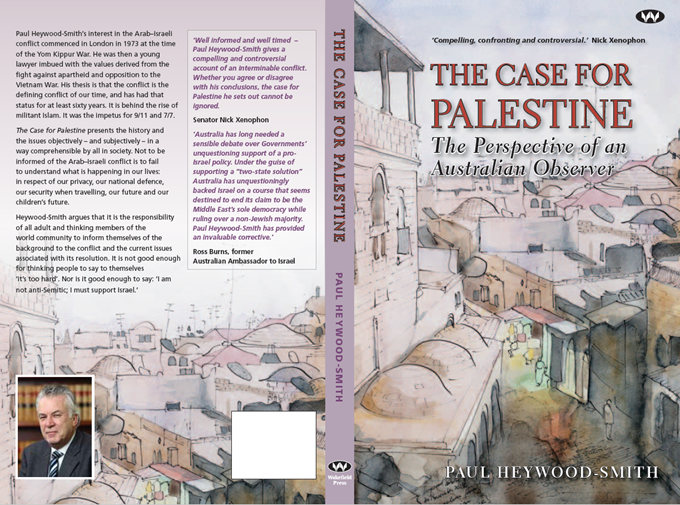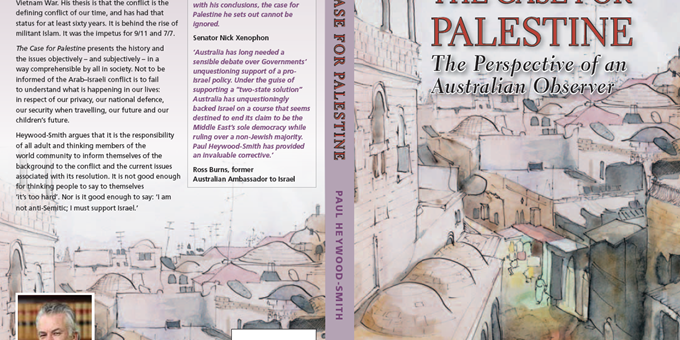Review of Paul Heywood-Smith, The Case for Palestine. The Perspective of an Australian Observer, Wakefield Press, Mile End, 2014, published in The Spectator Australia, 16 May 2015.

Paul Heywood-Smith, Queens Counsel and political autodidact, has written a weak case for Palestine. A much stronger book was there to be written, but the author’s cranky perspective mars his ability to present it.
Published by Wakefield Press in paperback, with notes, a short bibliography, and index, the book is attractively presented. At 140 pages, this Penguin-like pocket polemic, with its simplistic depiction of deeply complex problems, threatens to become influential.
Launched in April in Sydney by former Foreign Minister Bob Carr, since publication in October the work has already sold past its first run, and is now being reprinted. Sales are expected to hasten prior to the ALP Federal Conference in July where resolutions calling for the alternative party of government to ‘recognise’ Palestine are expected there and to be canvassed in the wider community.
The book is skewed by the author’s obvious ignorance, tendentious style, and grindingly eccentric takes on the history of the Middle East and beyond. His views have been gathered over many years as zealous supporter and former Chairperson of Australian Friends of Palestine. Brooding on some of the problems of the Israeli-Palestinian conflict, he frequently fails to adequately consider alternative perspectives.
Chapters, 1 to 3 are history lessons prior to Israeli independence. Chapters 4 to 6 survey the history of Israel’s battles against an array of adversaries. Chapter 7 is a barrister’s brief against the existence of Israel’s security wall, with the remaining Chapters covering the 2006 Lebanese War, US-Israel relationship, certain myths, the position Australia might take, and potential resolutions to the conflict.
Heywood-Smith is an unsteady captain of this ship and sometimes runs aground. His caveat that his ambition might outstretch his ability as an historian is amply evidenced. Two egregious clangers are the naming (p. 19) of the social democrat Russian Prime Minister Kerensky as a “Jewish Bolshevik” (he was neither) and the claim (p. 41) that Sir Raphael Cilento, having merely “questioned” “Zionist imperialism”, was drummed out of Australian diplomatic life. (Cilento was a Holocaust denier, big supporter and donor to the far-right League of Rights, in short, an anti-semitic ratbag).
Superficial, sophomoric judgements abound in this philippic. Chapter 7 argues that Israel has no right to build a wall to protect its citizens from terrorist attack. The 2004 advisory opinion (not judgement) of the International Court of Justice, cited in the book, as interpreted by Heywood-Smith requires the demolition of every bit of the security barrier. This is an impossible and unrealistic imposition on Israel (putting aside whether boundaries and details might need adjustment). Heywood-Smith’s analysis, or rather lack thereof, highlights an unworldly, fiercely partisan, and woefully impractical ideology. This signals a failure to take seriously Israeli perspectives.
An introduction from American historian Lawrence Davidson sets the scene with the assertion that (p. x): “Resistance coming from Gaza is more pronounced and usually takes the form of retaliatory missile attacks for Israeli border crossings and air strikes.” Ah-huh, that simple, then.
Heywood-Smith raises the discredited claim that most Jews are actually not descendants from the land of Israel but Khazar converts, a possibility that discredits Zionism (p. 13). He even manages to claim that the Grand Mufti of Jerusalem, Amin al Husseini, the notorious Hitler supporter during WWII, hardly amounted to much: “There is no evidence, however, that Amin’s views translated into material support for Nazi Germany from the Palestinian people.” All he ever did was raise a volunteer Muslim SS contingent in the Balkans (p. 36). Almost harmless, really.
In a potted history of WWI, Heywood-Smith argues “Britain became desperate to bring the US into the conflict. This enabled Zionists to play a winning card” – implying (p. 27) that they bargained with Britain to support a Zionist state. All this shows is that Heywood-Smith cannot help finding a point and embellishing it. He claims that all of the contemporary problems with the Middle East stem from western imperialism and the creation of Israel. This is simple-mindedness writ large.
He snidely questions whether Australian Labor MP Michael Danby, who is Jewish, is guilty of dual loyalties (p. 107). Those readers of Irish Catholic background would be familiar with this WASPish bigotry.
Bizarrely, Heywood-Smith claims that then Israeli Prime Minister Ehud Barak refused to meet with Yasser Arafat in 2000 at the Camp David Summit convened by US President Clinton. (This is where Barak offered the Palestinian Authority nearly 97% of the West Bank, plus land swaps). Instead of transparency, as the Palestinians wanted, the Israelis traded in secrecy, Heywood-Smith claims (p. 56). He expresses sympathy for the Boycott Divestments and Sanctions (BDS) campaign (pp. 111f.), and complains that the Palestinian Authority is complicit with doing deals with Israel and “so clearly does not represent the Palestinian people.” (p. 117). Australian-born former US Ambassador to Israel Martin Indyk, a consistent critic of Israeli PM Netanyahu as adviser to Presidents Clinton and Obama, is dismissed as a Zionist. (p. 81).
So, what are Heywood-Smith’s solutions? “The Jewish communities that thrived for centuries in Morocco, Tunisia, Baghdad, Damascus, Istanbul and Seville, to mention but a few sites, should be encouraged to restore themselves.” (p. 39). The insights do not get better than that.
In three places in the book, Lucretius’s dictum is quoted, “so great is the power of religion to lead us to evil”, but shorn of context, this is a superficial judgement. Religion is not the problem, but rather men’s capacity to do wrong and evil in the name of God. This is actually the point Lucretius makes in his On the Nature of Things from which this line is cherry-picked.
A more informed book would have presented a nuanced case to answer. Heywood-Smith, however, seems ignorant of the debate within Israel about the wrongs associated with Israel’s early years and the many revisionist studies, such as Ari Shavit’s My Promised Land: The Promise and Tragedy of Israel (2014).
A true friend of Israel is a friend of Palestine. The reverse is also true. Or should be. Marxist sociologist Isaac Deutscher once offered an analogy for the creation of the state of Israel. A Jewish man jumps from a burning building, and he lands on a Palestinian, horribly injuring him. Who can blame him? Is anyone at fault? This insight – and the many twists and interpretations that follow – conveys part of the tragedy of the Nakba (the Palestinians’ view of their 1948 dispossession). The controversy over settlements is another part of the on-going saga.
So long as the debate, as with this book, is presented in terms of Palestine versus Israel, instead of Palestinians and Israelis living alongside each other, there will be tragedy, more burning buildings, more trampling of innocents below. Heywood-Smith’s perspective obscures that shining insight.
Postscript (2015)
Mr Heywood-Smith threatened to sue the editor of the Australian Spectator magazine and I personally, writing to us both to that effect.
Challenging my perspective, his ‘Letter to the Editor’, spelling mistakes and all, was published in a subsequent issue. Insistently, amongst other declaratory thoughts, he thundered that it was still an open question whether Kerensky was Jewish or not. This suggested a wacky crankiness in the man.
Heywood-Smith’s perspective on Cilento was possibly inspired by Sir Walter Crocker (1902-2002), a conservative, veteran Australian diplomat who in one book, Australian Ambassador: International Relations at First Hand, Melbourne University Press, Carlton (1981) was sympathetic to the ratbag. What was said did not ring true. I knew from my searches that Sir Richard Casey, when Australian Foreign Minister, counselled anyone who asked about Cilento’s extremist views. I typed in Cilento + anti-Semitism into Google and discovered articles praising Cilento by Eric Butler, the head of the far right, anti-semitic League of Rights, which Cilento had long supported, financially and otherwise. Butler’s comments on Cilento suggested he was a Holocaust denier. Enough to conclude, to put matters gently, that Heywood-Smith had not been sufficiently curious.







